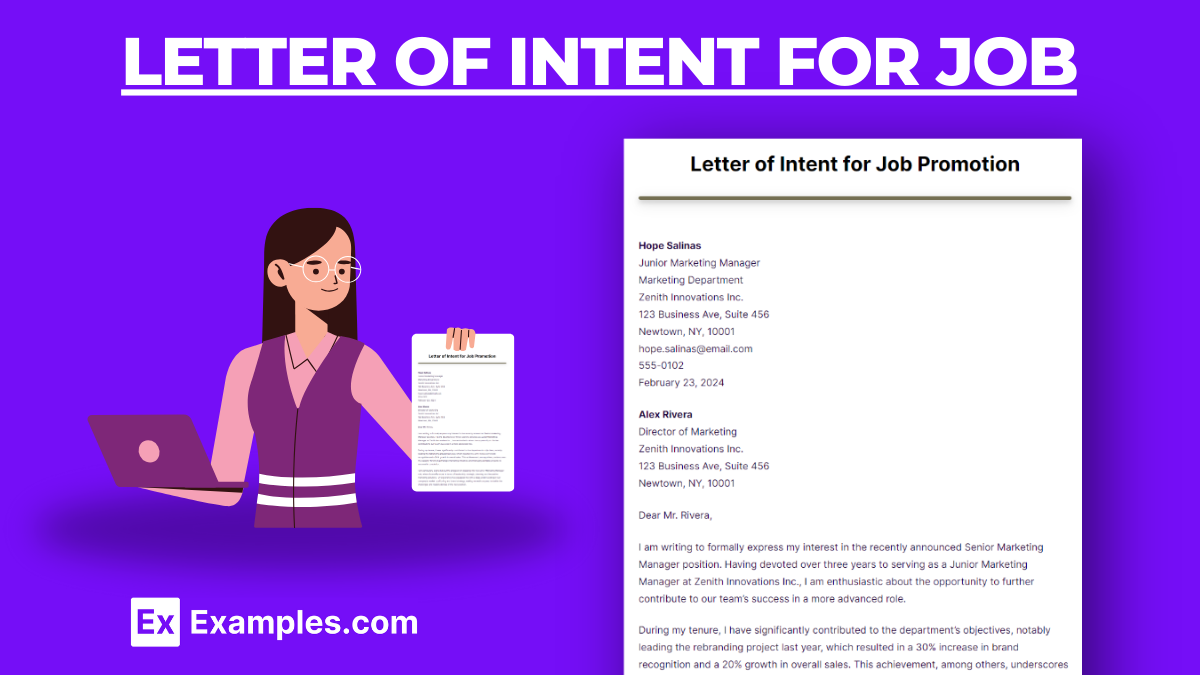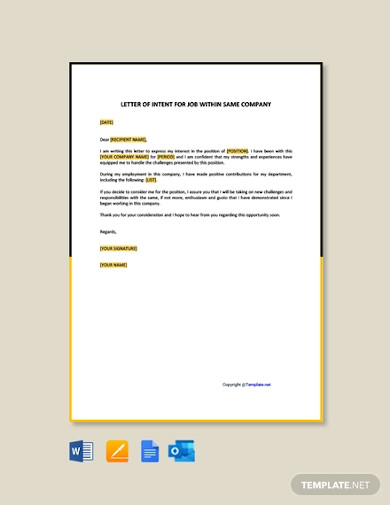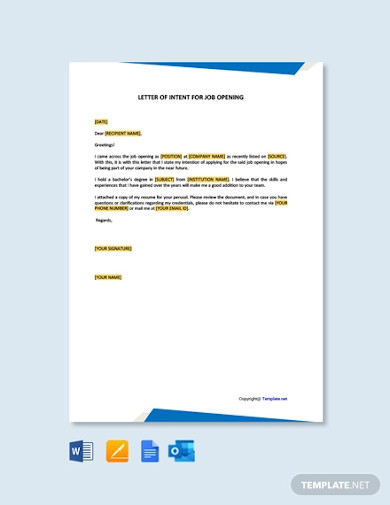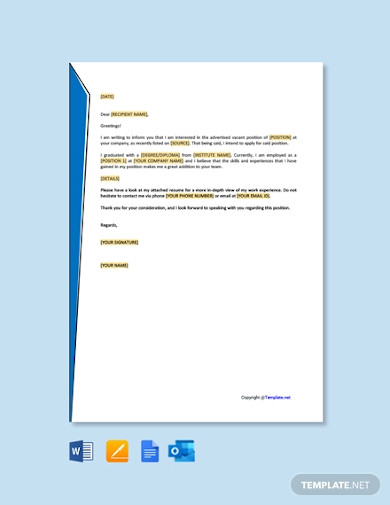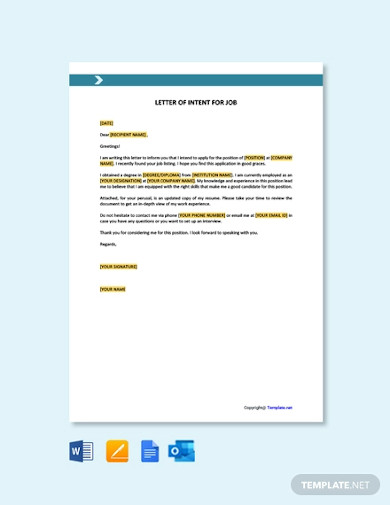7+ Letter Of Intent for a Job Examples to Download
Job hunting in a corporate jungle is a struggle most people rarely get excited to experience. It’s a competition of skill, background, and a presentation of your personality. If you want to raise your chances of getting hired at a company that you’ve been dying to enter, express your interest with a letter of intent. While this may not guarantee a definite pass, this introduces you to the company’s recruiting agents even when they have no job postings. This helps them with their selection process and in knowing who to choose among the candidates. Because you’ve already expressed a keen interest in joining them, you’ll be among the firsts on their list.
What is a Letter of Intent for a Job?
A Letter of Intent for a Job, sometimes known as a letter of interest, is a type of document that a job seeker submits to a company to express their interest in working there, even if there are no advertised job openings. It serves as a proactive approach to potentially securing employment at a desired organization. Unlike a cover letter that accompanies a resume for a specific job application, a letter of intent focuses more broadly on your interest in the company and your desire to be considered for future positions that match your skills and experiences.
Purpose of a Letter of Intent for a Job
The primary purpose of a letter of intent for a job is to:
- Showcase Your Interest: Demonstrate your enthusiasm and genuine interest in the company and its mission.
- Highlight Your Skills and Experiences: Provide a brief overview of your qualifications that make you a suitable candidate for potential job opportunities.
- Initiate Contact: Serve as a means to initiate contact with the employer, making them aware of your interest and availability.
- Stand Out: Differentiate yourself from other job seekers by taking a proactive approach to your job search.
Letter of Intent for a Job Format
Creating a compelling Letter of Intent for a Job involves following a specific format to ensure clarity and professionalism. Below is a detailed format that can guide you through writing your letter effectively:
Heading
- Your Name
- Your Address
- City, State, Zip Code
- Your Email Address
- Your Phone Number
- Date
Recipient’s Information
- Employer’s Name (if known)
- Company Name
- Company Address
- City, State, Zip Code
Salutation
- Dear [Employer’s Name or Hiring Manager]:
Introduction
- Introduce yourself and mention the purpose of your letter.
- Express your interest in the company and the reason for your unsolicited application.
Body Paragraph(s)
- Highlight your key qualifications and experiences relevant to the company or industry.
- Demonstrate your knowledge of the company and how you can contribute to its goals and challenges.
- Specify the type of position you are seeking and why you are interested in working for this particular company.
Conclusion
- Reiterate your interest in the company and the potential to contribute.
- Express your desire for a meeting or discussion to explore possible opportunities.
- Thank the recipient for considering your letter and indicate how you plan to follow up.
Complimentary Close
- Sincerely,
- [Your Name]
Enclosures
- Mention any enclosures, such as your resume, portfolio, or other documents, if applicable.
What to Include in a Letter of Intent for a Job
A Letter of Intent for a Job is your opportunity to make a strong first impression on potential employers. It should convey your interest in the company, highlight your qualifications, and demonstrate how you can contribute to their success. Here’s what to include to make your letter stand out:
Personal Information and Date
- Your Contact Information: Include your name, address, phone number, and email address at the top of the letter.
- Date: The date when the letter is written.
Employer’s Details
- Recipient’s Name and Title (if known): Addressing the letter to a specific person shows you’ve taken the time to personalize your application.
- Company Name and Address: Demonstrates attention to detail and ensures the letter reaches the correct place.
Salutation
- Formal Greeting: Use “Dear [Name]” if you know the recipient’s name. If not, “Dear Hiring Manager” is a suitable alternative.
Introduction
- Purpose of the Letter: Clearly state that you are writing to express your interest in the company and any specific positions or areas of work.
- Your Interest in the Company: Mention why the company appeals to you and how your goals align with its values and objectives.
Body
- Summary of Qualifications: Briefly outline your relevant experience, skills, and achievements that make you a good candidate.
- Connection to the Company: Explain how your background can contribute to the company’s goals or address specific challenges they face.
- Specific Position or Area of Interest: If applicable, mention any particular roles or departments you are interested in.
Conclusion
- Call to Action: Express your desire for a follow-up, such as a meeting or interview, to discuss your qualifications and how you can contribute to the company in more detail.
- Thank You: Thank the recipient for considering your application and reading your letter.
Complimentary Close
- Formal Close: Use a professional closing, such as “Sincerely,” followed by your name.
Enclosures or Attachments
- Mention of Enclosures: If you are including your resume or any other documents, mention them at the end of the letter.
Key Points to Remember
- Customization: Tailor your letter to the company and the specific type of work you are seeking. Show that you have researched the company and understand its needs.
- Professionalism: Maintain a professional tone throughout the letter. Avoid overly casual language and ensure there are no spelling or grammatical errors.
- Conciseness: Keep your letter concise and to the point. Aim for one page, highlighting only the most relevant information.
Tips for Writing a Letter of Intent for a Job
Crafting a compelling Letter of Intent for a Job is crucial for making a positive impression on potential employers. Here are key tips to help you create an effective letter that highlights your interest and qualifications:
Personalize Your Letter
- Research the Company: Demonstrate your knowledge of the company’s values, culture, and goals. Mention specific projects or achievements that inspire you.
- Address the Letter to a Specific Person: Whenever possible, find out the name of the hiring manager or the person in charge of recruitment and address the letter to them directly.
Highlight Your Qualifications
- Match Your Skills with Company Needs: Clearly articulate how your skills, experiences, and achievements align with the company’s current objectives or challenges.
- Be Specific: Use specific examples to demonstrate your accomplishments and how they can be beneficial to the company.
Show Genuine Interest
- Explain Why You Want to Work There: Beyond stating your qualifications, express why you are drawn to the company and how you see yourself contributing to its success.
- Be Enthusiastic: Your passion for the company and the position should come through in your writing.
Be Professional and Concise
- Keep It Short: Aim for a one-page letter that is easy to read. Be concise but thorough in conveying your message.
- Use a Professional Tone: Maintain a formal tone throughout the letter. Avoid slang and overly casual language.
Call to Action
- Request a Meeting or Interview: Politely express your desire for a personal meeting or interview to discuss your qualifications and how you can contribute to the company in more detail.
- Indicate Follow-up: Mention that you will follow up on your letter of intent after a certain period, but also invite the recipient to contact you at their convenience.
Proofread Your Letter
- Check for Errors: Carefully proofread your letter to correct any spelling, grammar, or punctuation mistakes. Errors can detract from the professionalism of your letter.
- Get Feedback: If possible, have someone else review your letter for clarity, impact, and errors.
Customize for Each Application
- Tailor Each Letter: Avoid using a generic template for all applications. Customize each letter to reflect the specific company and role you are interested in.
Be Mindful of the Format
- Professional Formatting: Use a standard business letter format, including a header with your contact information, date, employer’s contact information, a formal greeting, body paragraphs, a closing, and your signature.
Include Relevant Attachments
- Mention Enclosures: If you are including a resume or portfolio, make sure to mention these documents at the end of your letter.
Samples Letter of Intent For A Job
- Letter of Intent for Job Promotion
- Letter of intent for Job Vacancy
- Letter of intent for Job Position
- Letter of intent for Job within the Same Company
- Letter of intent for Job in Government
- Letter of intent for Job for Transfer
- Letter of intent for Job for School
- Letter of intent for Job for interview
- Letter of intent for Job for internship
7+ Letter Of Intent For a Job Examples
1. Letter of Intent for Job within Same Company
Download2. Letter of Intent for Job Opening
Download3. Letter of Intent for Job Application
Download4. Letter Template of Intent for Job
Download5. Simple Letter Of Intent Job
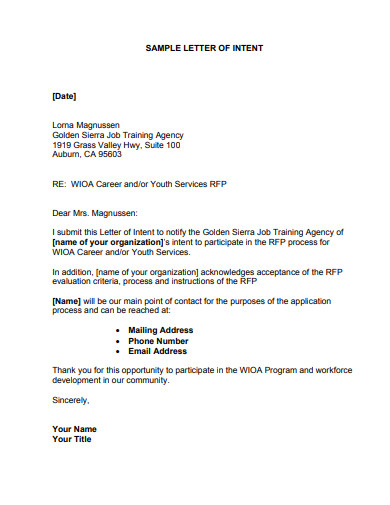
6. Job Promotion Letter of Intent
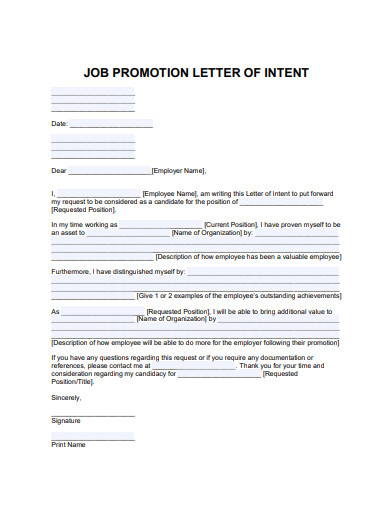
7. On-the-Job Training Plan for Letter of Intent
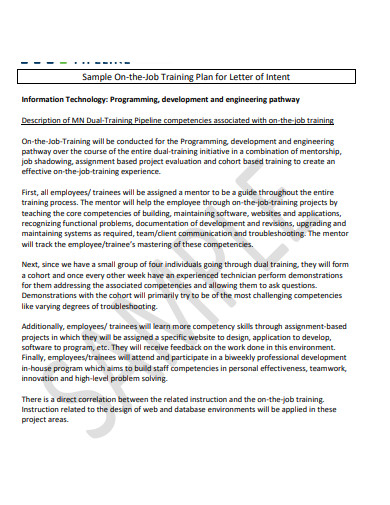
8. Sample Letter Of Intent Job
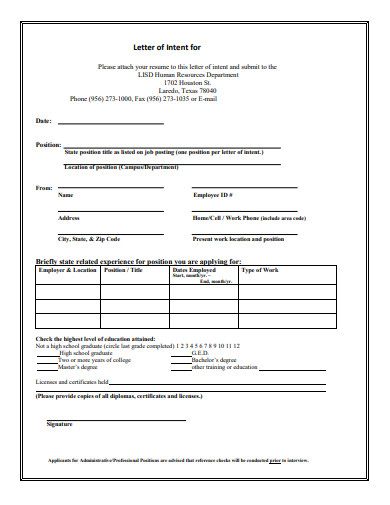
Why Write a Letter of Intent for a Job?
Writing a Letter of Intent for a Job is a strategic step in the job search process, offering several advantages to the job seeker. Here’s why crafting a letter of intent is beneficial:
Proactive Job Searching
- Unadvertised Opportunities: Many positions are filled through networking and internal referrals before they ever get advertised. A letter of intent can help you tap into these hidden job markets.
- Show Initiative: Sending a letter of intent demonstrates your proactive approach and eagerness to work for the company, traits that are highly valued by employers.
Personal Branding
- Highlight Your Strengths: It allows you to present your skills, experiences, and achievements in a narrative that aligns with the company’s goals, effectively branding yourself as the ideal candidate.
- Stand Out from the Crowd: In a competitive job market, a letter of intent can differentiate you from other applicants by showcasing your specific interest in the company and how you can contribute uniquely.
Establish Connections
- Initiate Contact: It serves as an introduction to potential employers, helping you establish a connection with the company and its hiring managers.
- Networking: Even if there aren’t current openings, your letter can lead to informational interviews, advice, or referrals to other opportunities within the company or industry.
Demonstrate Your Knowledge and Enthusiasm
- Company-Specific Tailoring: A well-researched letter that mentions specific aspects of the company’s work shows that you have a genuine interest in and enthusiasm for the organization.
- Cultural Fit: You can express how your values align with the company culture, an important factor for many employers in making hiring decisions.
Potential for Future Opportunities
- Keep You in Mind: Even if there are no immediate openings, a compelling letter of intent can encourage employers to keep your information on file for future opportunities.
- Follow-Up Opportunities: Writing a letter of intent opens the door for follow-up communications, keeping your name and qualifications fresh in the minds of hiring managers.
Personal Reflection
- Clarify Your Career Goals: The process of writing a letter of intent encourages you to think critically about your career goals and how they align with the company’s objectives.
- Self-Assessment: It requires you to articulate your skills and experiences, offering a chance for self-reflection and a clearer understanding of your professional value.
How Does a Letter of Intent Differ From a Cover Letter?
Understanding the distinction between a Letter of Intent and a Cover Letter is crucial for job seekers aiming to effectively communicate their interest and qualifications to potential employers. Here are the key differences:
Purpose and Usage
- Letter of Intent: Often unsolicited, it expresses your interest in the company and the desire to work there in the future, even if there are no current openings. It’s a proactive approach to job searching, showcasing your qualifications and explaining why you’re drawn to the company.
- Cover Letter: This is a document sent alongside your resume in response to a specific job opening. It’s tailored to the job description, highlighting how your experience and skills make you the ideal candidate for the position.
Content and Focus
- Letter of Intent: Broad in scope, it emphasizes your overall interest in the company and the industry. It outlines your qualifications without tying them to a specific job role, focusing on how you can contribute to the company’s goals and growth.
- Cover Letter: Highly specific, it addresses the requirements listed in the job posting, providing examples from your work history that demonstrate your suitability for the specific role. It answers the question, “Why should we hire you for this job?”
Tone and Structure
- Letter of Intent: While still professional, it can be slightly more exploratory in tone, inviting dialogue about potential opportunities that might fit your skills and experience.
- Cover Letter: Direct and concise, it directly responds to the job posting, with a structure that often mirrors the listed qualifications and requirements, making a strong case for your candidacy.
Timing and Recipient
- Letter of Intent: Sent independently of job openings, it may be directed to a hiring manager, department head, or even a company executive, depending on the size of the organization and the nature of your interest.
- Cover Letter: Always accompanies a job application or resume submission for a specific advertised position, addressed to the hiring manager or the person listed in the job posting.
Objective
- Letter of Intent: The goal is to initiate contact, make a memorable impression, and encourage the employer to consider you for future opportunities or to create a position that matches your skills.
- Cover Letter: Aims to secure an interview for a specific job, emphasizing your qualifications and readiness to excel in the role advertised.
Impact on Job Search Strategy
- Letter of Intent: Demonstrates initiative and broad interest in the company, potentially opening doors to unadvertised positions or informational interviews.
- Cover Letter: Tailors your application to a specific role, aiming to move you to the next step in the recruitment process for that job.
In summary, while both documents are crucial tools in the job search process, a Letter of Intent is more about expressing a general interest in working for the company and exploring potential opportunities, whereas a Cover Letter is a targeted pitch for a specific job opening. Each serves a unique purpose, and understanding when and how to use them can significantly enhance your job search strategy.
FAQs
What is a Letter of Intent to Keep a Job?
A Letter of Intent to Keep a Job is a document an employee submits to their employer expressing their desire to continue working in their current position. It highlights their commitment to the job and the company, and may outline their achievements and contributions.
How Do You Write a Good Letter of Intent?
To write a good Letter of Intent, personalize it for the recipient, clearly state your purpose, highlight your qualifications and achievements, express genuine interest in the role or company, and conclude with a call to action, inviting further discussion.
How Do I Write a Letter of Intent for a New Job?
Writing a Letter of Intent for a New Job involves researching the company, specifying your interest in it, summarizing your relevant skills and experience, and expressing enthusiasm for potential opportunities. Conclude by requesting a meeting or conversation to discuss your application further.


